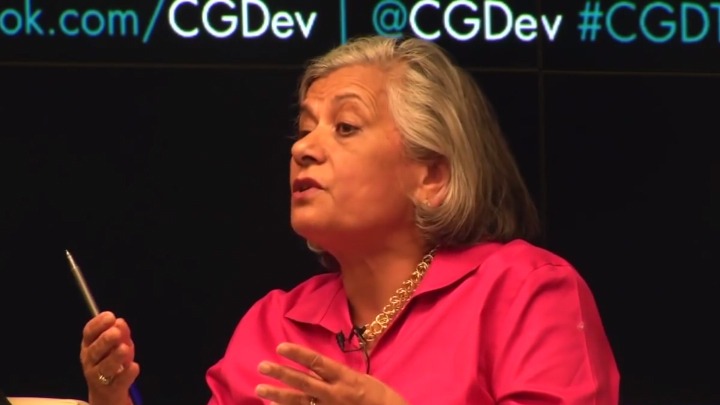
Protection for Survival Migrants: Policy Tweaks for Outsize Impact
Published on
By Hannah Postel, Center for Global Development
Last year, twenty-four people fled their homes every minute. More people are now displaced outside their home than at any other time since UNHCR records began; these mass movements will only continue as conflict, disaster, extreme poverty, and other hardships force people to seek safety and opportunity. Unfortunately, most recent policy solutions have been ad hoc and based in fear. Can we do better? CGD and co-host ODI recently convened a panel of experts to discuss the economics and politics of this crucial question. CGD Senior Fellow Michael Clemens was joined by Ratna Omidvar, a member of Canada’s Upper House of Parliament, ODI Managing Director Marta Foresti, and Talent Beyond Boundaries Executive Director Sayre Nyce to share a number of policy innovations with the potential to create shared value for survival migrants and destination countries alike.
Outstanding solutions
The panelists all agreed that what has been decreed a migration or refugee crisis is rather a crisis of politics. Politically viable solutions to larger movements of people seeking safety have been achieved in the past, and are in fact a key part of Europe’s history. Foresti pointed out that due to a lack of solidarity, German Chancellor Angela Merkel was forced to backpedal on her original strong leadership in accepting refugees. As the recent Brexit vote and the rise of far-right parties have shown, current policies have been based on fear, not pragmatism. Sudden flows of migrants raise legitimate security concerns, but experts see security best enhanced by innovative channels for well-regulated and mutually beneficial forms of movement rather than militarization and increased informality. The number of recent arrivals in Europe has been difficult to manage mainly due to a lack of much-needed solidarity and responsibility sharing.
Out of touch with reality
Moreover, the current international system is not built to accommodate the needs of people currently on the move. The definition of a refugee was established 60 years ago for a completely different political context, and does not include other motivations of survival migration, including climate change, natural disasters, and extreme poverty. Watch Clemens describe those left out of the current system:
It is clear that the prevailing aim of migration policy has been to obstruct movement. The European Union has dedicated €1.8 billion to combatting the “root causes” of movement in Africa, in hopes of encouraging people to stay home. However, Foresti described recent ODI research showing the impossibility of changing someone’s mind about migrating. In fact, attempting to shut people out yields a vast missed opportunity. As Clemens and coauthors have shown, the exact same person doing the exact same task can make up to ten times more in one place than another. Admitting refugees to fill labor market needs would benefit both the refugee and the host country. CGD was fortunate to recently host acclaimed journalist and political economist Philippe Legrain to describe the findings of his recent report Refugees Work. Rather than being a burden, Legrain cites research by the International Monetary Fund suggesting that welcoming refugees pays off, yielding two euros in economic benefits for every one invested – within five years.
Notable policy innovations
However, a few standout examples illustrate that these challenges are not insurmountable. Omidvar and Nyce both shared compelling strategies targeted at unlocking the great potential of refugees in destination countries. Canada’s private sponsorship program has been lauded for its efficiency and additionality, enabling private citizens to host refugees above and beyond those admitted through formal government channels. In contrast to the dominant political narrative in the US and Europe, Omidvar described how “every level of government in Canada has sought to outdo itself to accept more refugees,” based on the fundamental belief that Canada will succeed better if refugees and immigrants prosper with it. Watch Omidvar explain more details of the “Canadian exceptionalism” embodied in this program’s success below.
Talent Beyond Boundaries has taken a more market-based approach, focusing on labor mobility for refugees worldwide. It recently launched a pilot program linking this largely overlooked talent pool – refugees – to the global labor market. Its Talent Catalog accumulates and verifies data on refugee skills and preferences including work history and education, enabling corporate partners facing skill shortages to directly fill labor needs. This approach both gives refugees an opportunity to be self-reliant and helps countries and local economies in need of skilled workers.
Moving forward
The panelists all agreed on the potential to look for solutions in non-traditional destinations, experimenting with ideas less contingent on toxic national politics. Talent Beyond Boundaries has taken this idea to heart, focusing on companies in non-traditional destinations such as Africa and Latin America rather than the US, Europe, and the Gulf. Clemens’ proposed Global Skills Partnership would be a new kind of agreement between employers and/or governments in destination countries and training centers in origin countries, to link skill formation with migration for the mutual benefit of origin countries, destination countries, and migrants.
Massive strides can also be made through minor tweaks to existing immigration regulations. Nyce explained how the need to mark a “country of return” on a work visa application to the US all but prevents refugee admission, due to the lack of a stable home country. Part of Canada’s success in welcoming refugees so efficiently has come from the government’s decision to designate all Syrians outside of Syria as prima facie refugees. This bypasses the need for UNHCR refugee status validation, a process that can take years, Omidvar explained. She also highlighted the strides that could be made by making travel safer. Thousands of asylum-seekers have tragically perished on perilous boat and land journeys – often paying a smuggler multiple times more than a plane ticket would cost. Establishing a humanitarian visa system would both save lives and undercut smuggling markets.
“When you have crises of the kind we are experiencing today,” Omidvar concluded, “there is a huge amount of chaos, and from this chaos comes points of light that you can learn from, absorb, and embed into policy.” We share Omidvar’s optimism, and hope that the global community will take advantage of opportunities to think outside the box and create a 21st century migration policy founded on pragmatism and mutual benefit.
Thanks to Michael Clemens for helpful comments.
Source: Center for Global Development
Click here for the CGD Podcast from August 2, 2016 featuring Ratna Omidvar.






